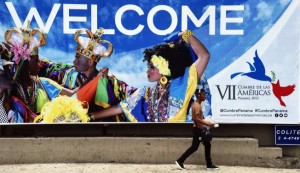
The U.S. government has hoped that the olive branch it extended to Cuba in December would reshape its image in the eyes of Latin American leaders, who have oft perceived the U.S. attitude toward the region as patronizing and high-handed. Friday’s Summit of the Americas in Panama, the seventh such meeting of up to 35 heads of state and government, will be underscored by the restoration of U.S.–Cuba ties, but also by the new sanctions issued by the Obama Administration targeting Venezuelan officials it has accused of human rights abuses. In the time since, President Nicolás Maduro has spoken of little else.
“The summit could get hung up on the region’s dislike of sanctions . . . which Maduro and his allies have used as proof that the United States has continued in its trajectory of paternalistic behavior” in the region, said Carl Meacham, director of the Americas Program at the Center for Strategic and International Studies.
Cuban President Raúl Castro will also be attending the Summit, but although no formal meeting has yet been planned between Presidents Obama and Castro, there will still be ample opportunity for the two leaders to continue conversations toward restoring full diplomatic relations. And despite the noise radiating from regional reactions to the Venezuelan sanctions, Mr. Obama’s popularity in Latin America has been soaring, a product of both the Cuba opening and a broad recognition that the Administration has done all in its legal authority to change immigration policy.
“[The Summit is] going to be heavy on symbolics and high drama,” Meachem said, not expecting to see any major policy deliverables from the Summit. Added White House Deputy National Security Advisor Ben Rhodes, “We certainly would expect the Venezuelan government to express its opposition to certain U.S. policies. Our point would simply be the United States stands up for a set of values in every country in the world.”
Havana, meanwhile, had since refused to reopen embassies until the U.S. government removed Cuba from the State Department’s list of state sponsors of terrorism, a task that is reportedly on the verge of completion. Whether a mere photo-opp or a strategic meeting for leaders of the Western Hemisphere, the Summit could be an indicator of policy direction and intention in the weeks, months and years to come.

Recent Comments